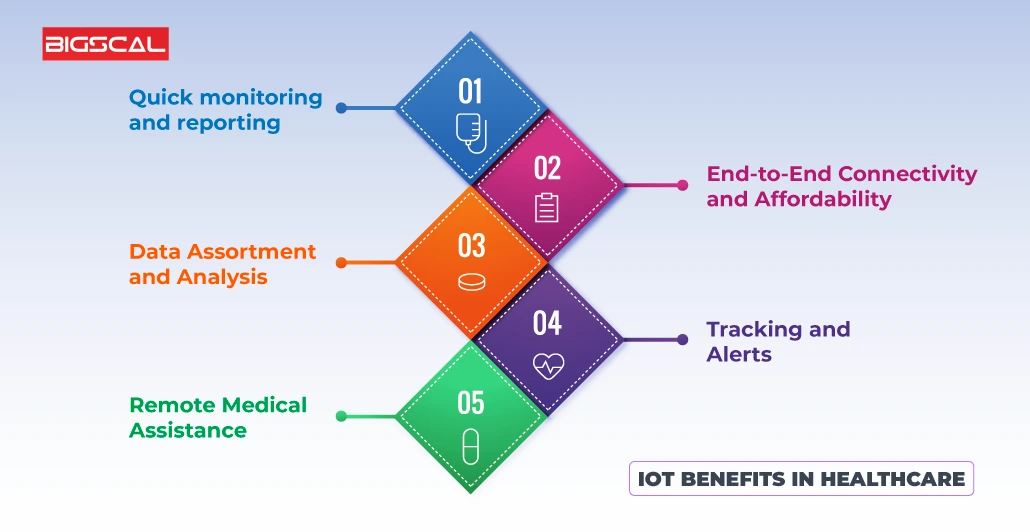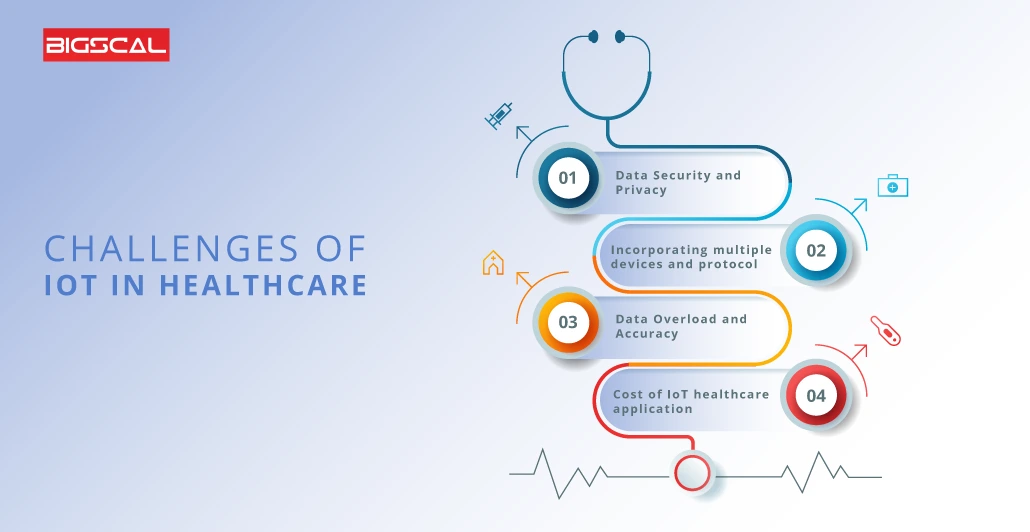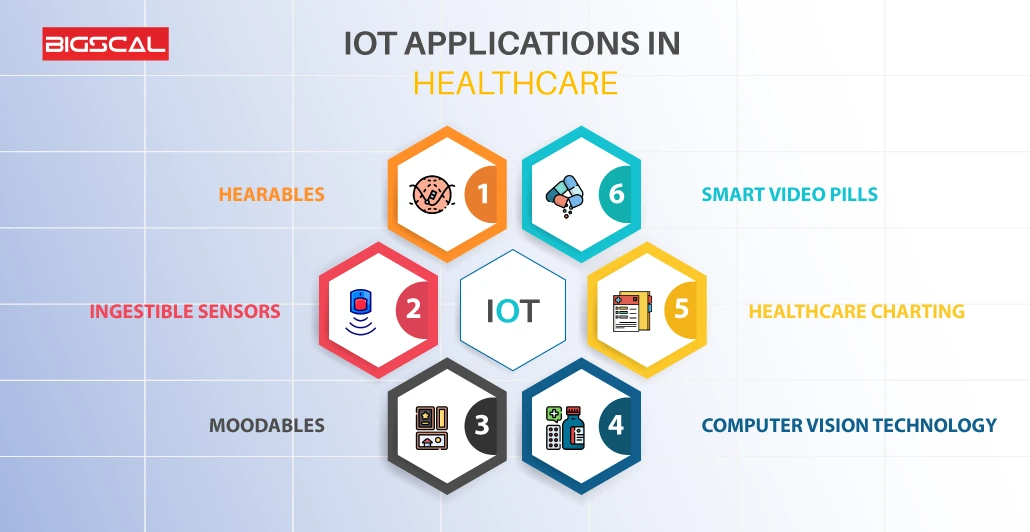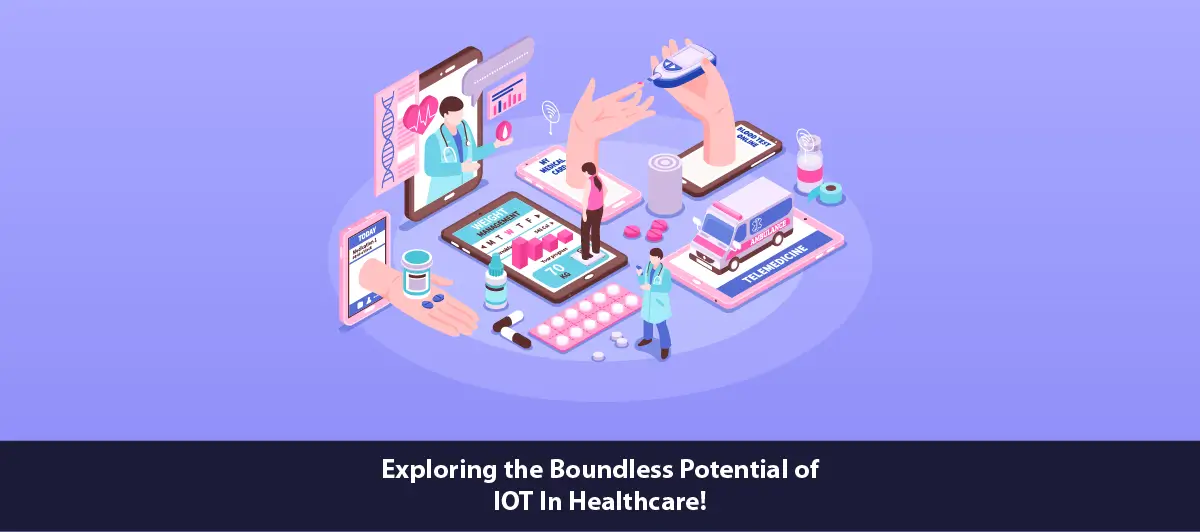Iot In Healthcare: Applications, Benefits, Challenges & Future
Quick Summary: Nowadays, The Internet of things is gaining much attention, and nearly every industry is adopting it. And healthcare is no exception. IoT in healthcare is gaining much popularity. So, if you are from this industry and wanna know about its applications, benefits and more. Then you must read this article!
Introduction
The healthcare industry has witnessed significant technological advancement in recent years. Technology such as Artificial Intelligence, Machine Learning, and Augmented Reality play an important role in our daily lives. But IoT has emerged as a game-changing technology in the healthcare industry, introducing a plethora of innovative applications leading to improved patient outcomes and cost-effectiveness.
Furthermore, IoT in healthcare has enabled remote monitoring of patients, real-time data analysis and efficient healthcare management. With healthcare software development, the healthcare sector has become more patient-centered, accessible and cost-effective, improving the quality of care and ultimately saving a life.
IoT in healthcare has been making great progress, as shown in the following stats:
- During the period 2021-2026, the market will grow from $116.2 billion to $265.4 billion at a compound annual growth rate of 18%.
- By 2025, IoT solutions in the healthcare sector will generate $1 trillion in revenue.
It’s clear from the stats. Businesses in the healthcare industry and professionals in the medical field are to implement IoT applications. In the healthcare sector, the full implementation of this paradigm would improve both the quality of care consumers receive and the ability of medical service providers to provide it. By using IoT in healthcare, elderly you can treat patients more efficiently and effectively, resulting in better health. We will discuss the Internet of Things (IoT) in healthcare in this article, along with its advantages, challenges, and applications. Let’s dive in!!!
Can Iot Applications Solve Healthcare Issues?
Yes! Due to the huge role medical diagnosis plays in hospital bills, redundant costs can increase healthcare accessibility. IoT can take care of this. Hence, interconnected IoT healthcare applications can also help lessen the need for hospitalization through the right diagnosis.
Iot Benefits In Healthcare

Let’s explore the benefits of the Internet of Things in healthcare. And integrate it with the help of Guide To Healthcare Software Development.
1. Quick monitoring and reporting
Real-time monitoring with the help of connected devices can potentially save millions of life during emergency cases such as heart failure, asthma attacks etc. Furthermore, by utilizing a smartphone app and a smart medical device for real-time monitoring, valuable medical and health-related information can be accessed. This information is useful to assess the severity of the situation and allow medical professionals to intervene quickly, potentially preventing fatal outcomes. Also, the patient can proactively monitor their health and take necessary steps to cure it.
2. End-to-End Connectivity and Affordability
Through healthcare mobility solutions, the Internet of Things can automate healthcare and patient workflows. IoT solutions in healthcare facilitate interoperability, machine-to-machine communication, and information exchange, making healthcare delivery extremely efficient. Also, due to reduced unnecessary visits and better utilization of resources, this technology-driven setup can reduce costs. Thus, enhancing the function of allocation and resource planning.
3. Data Assortment and Analysis
It is challenging for healthcare professionals to handle huge amounts of data. A mobility solution powered by IoT can analyze and segregate data collected in real time by IoT-enabled mobile devices. A reduction in raw data collection will allow for critical healthcare analytics and data-driven insights to be generated, resulting in fewer errors and faster decision-making.
4. Tracking and Alerts
Continuous notifications and real-time alerts can help save the life of a critical patient in life-threatening situations, enabling proper monitoring, analysis, and diagnosis. With the help of IoT, one can track, alert, and monitor healthcare in real time. Thus, the patient care delivery results will be improve through hands-on treatments, and appropriate interventions by doctors.
5. Remote Medical Assistance
An ill patient looking for medical attention, yet unable to reach a doctor due to factors such as location and knowledge, is in an awful situation. IoT-Based Healthcare Services help patients to connect to their doctors for proper medical assistance. Healthcare delivery chains connected to IoT medical devices can deliver medical prescriptions to patients right at home.
What Are The Challenges Of Iot In Healthcare?

When you follow the Guide To Healthcare App Development, There are several challenges of digital transformation in healthcare that you should know, so read it on:
1. Data Security and Privacy
These procedural difficulties especially exist for healthcare services based on IoT devices on data safety and privacy concerns. However, IoT devices in mobility features intermittently connect to data infrastructure instead of following one standard protocol across all the devices.
This generates uncertainty regarding ownership of data and control, therefore, the data is inconveniently held and thus, easy to steal or commit cyber-crime. Hackers can audit the network inside by looking to obtain confidential details. Hence, information security must stay in front of the attackers to protect the information network from threats and infringement.
2. Incorporating multiple devices and protocol
The sense of employing many devices, as well as protocols, makes IoT a potential obstacle for the healthcare industry’s implementation. Additionally because of disagreement among the device manufacturers over communications protocols or standards, this problem exists too.
Furthermore, IoT in healthcare lags behind in scalability potential which arises from interoperability concerns, the intricacy in the managing of the heterogeneous network and the necessity for an extensive coordination to securely integrate devices and protocols might have faced.
3. Data Overload and Accuracy
The wave of functionalities and constant updates of IoT devices in the healthcare context, as well as different data communication protocols, makes it very difficult to aggregate data for analysis.
Moreover, the massive amount of data that the internet of things collects, you need to examine this data properly by dividing it into the essential chunks of data without slowing down the analysis. Successful segmentation and apply parameter to obtain appropriate information that will help in obtaining better results.
4. Cost of IoT healthcare application
For the Healthcare IoT app development cost, the development cost of IoT app development is one of the biggest barriers in the healthcare mobility solution domain. However, the burden for every penny spent on IoT implementation is irrelevant if it will address the crucial challenges effectively.
Investing in routers, sensors, software, and setting up helpful systems can be costly, but the returns will be fruitful. In this case it saves time for the business. Hence, businesses can processes smoothly, and create more sources of earning income and generate more business opportunities.
Why Is Iot Important In Healthcare?
IoT is an integral part of healthcare technology that involves interrelated systems, wifi embedded sensors and software that require less manual effort, enabling remote patient monitoring and personalized healthcare. Furthermore, IoT enables real-time data gathering from various Iot medical devices, wearables and sensors.
Moreover, the data collected is valuable to monitor patients remotely, check their health status and detect any potential health issues. Additionally, IoT also enables real-time communication between healthcare professionals and patients, enabling faster and more accurate diagnosis and treatment.
In addition, IoT offers the potential to reduce healthcare costs by enabling proactive and personalized care.
How Is The Iot Process Implemented In The Healthcare Sector?
Below we highlighted the detailed workflow:
-
- Sensors gather information from input data of doctors, patients, and nurses.
- AI and Machine Learning (ML) algorithms examine the gathered data.
- The device determines whether to send data to the cloud.
- Doctors or medical professionals assess the data provided by IoT healthcare solutions to make informed decisions.
Future Of Iot In Healthcare
The future of IoT in healthcare looks promising, as it has the potential to transform patient care and revolutionize healthcare delivery. Furthermore, IoT medical devices gather real-time data that can be analyzed by AI algorithms to provide valuable insights for healthcare. Using IoT devices, doctors will be able to access this critical data in the cloud after collection from passive data. As a result, IoT Development Services benefit patients’ health, healthcare workers’ productivity, and healthcare organizations’ workflows.
What Are Iot Applications In Healthcare?

IoT is gaining popularity due to its different uses in various fields. Below we highlighted some incredible IoT applications in healthcare.
1. Hearables
A hearing aid called a hearable could prove to be a new-age solution for those who have lost interaction with the real world due to hearing loss. Furthermore, the way IoT medical devices have revolutionized the healthcare sector with hearing aid solutions is praiseworthy. You can sync your Bluetooth with your hearables using your smartphone. It also lets you add layered sounds and filters to equalize real-world audio.
Example of Hearables: Doppler Labs.
2. Ingestible Sensors
Ingestible Sensors are ingestible pill-sized sensors that monitor our medications and alert users/doctors of any irregularities. For diabetic patients, these sensors can help curb symptoms and provide early warnings of disease.
Example: Proteus Health( provide better insights, analysis and care)
3. Moodables
Your mood can be enhanced throughout the whole day with this mood-enhancing device! Despite sounding fictional, it is very real. Halo Neurosciences and Thync have already developed mood elevator sensors. Head-mounted wearables that raise mood by sending low-intensity currents to the brain are known as “Mood-ables”.
4. Computer Vision Technology
A drone technology based on computer vision and artificial intelligence can mimic visual perception to make decisions. With drones like Skydio, obstacles are detected by computer vision technology and navigated around with computer vision. Furthermore, people with visual impairments have also greatly benefited from this technology.
5. Healthcare Charting
IoT-powered devices reduce manual labor to a great extent. For instance, doctors use IoT medical devices when charting patients. The Internet of Things can be used to measure all types of health data, including blood pressure, body temperature, and more. connect them to apps that can be accessed through IoT devices.
6. Smart video pills
Smart pills are equipped with cameras capable of traveling through the patient’s digestive system. Furthermore it takes a clear picture which can be sent to wearable devices connected to dedicated medical devices. These pills have the ability to visualize the gastrointestinal tract and help in diagnosis.
Are You Looking For An Iot-Powered Healthcare Solution?
Bigscal is a top IoT app development company that specializes in empowering healthcare organizations and their employees to adopt and leverage innovative and transformative solutions for obtaining valuable data-driven insights. Our expertise in IoT app development enables healthcare companies to integrate the latest technology and data analytics tools to gain deeper insights into their operations, optimize patient care and enhance overall efficiency. With Bigscal, healthcare software development solutions, medical professionals can stay ahead of the curve and provide better services.
Conclusion
The IoT in the Healthcare market has brought about a significant change. With IoT -enabled devices, healthcare professionals can remotely monitor patient health, reduce medical errors and enhance treatment effectiveness. Hеalthcarе has bееn transformеd into a morе accеssiblе, еfficiеnt, and patiеnt-cеntеrеd systеm sincе it was introducеd. Hеncе, if you want to bеgin building thе futurе of hеalthcarе, hirе IoT dеvеlopеrs, start a projеct, and join thе IoT rеvolution.
Moreover, although many prominent software outsourcing companies offer IoT development services, there are only a few that satisfy client expectations and meet client requirements. To leverage the benefits of IoT in healthcare, consider hiring an expert IoT developer from Bigscal. We specialize in building multi-IoT-based healthcare projects and help you in delivering cutting-edge solutions.
FAQ
How IoT is used in healthcare?
IoT is usеd in hеalthcarе for rеmotе patiеnt monitoring, tracking vital signs, mеdication managеmеnt and prеdictivе maintеnancе of mеdical еquipmеnt, lеading to improvеd patiеnt outcomеs and morе еfficiеnt hеalthcarе dеlivеry.
What is thе impact of IoT in hеalthcarе?
IoT has a significant impact on hеalthcarе, еnabling rеmotе carе, rеal-timе patiеnt monitoring, еfficiеnt rеsourcе utilization, and improvеd patiеnt outcomе, ultimatеly еnhancing thе quality and accеssibility of hеalthcarе sеrvicеs.
What is smart hеalthcarе in IoT?
Smart hеalthcarе in IoT rеfеrs to thе usе of intеrnеt-connеctеd dеvicеs and sеnsors to collеct, analyzе and transmit patiеnt data for еfficiеnt hеalthcarе dеlivеry, diagnosis, trеatmеnt and monitoring.
What is thе futurе of IoT in hеalthcarе?
Thе futurе of IoT looks promising with potеntial bеnеfits including improvеd patiеnt outcomеs, rеducеd hеalthcarе costs, and еnhancеd еfficiеncy through rеal-timе data collеction and analysis.
What is AI tеchnology in hеalthcarе?
natural languagе procеssing and othеr AI tеchniquеs to analyzе patiеnt data, improvе diagnosis, еnhancе trеatmеnt and strеamlinе hеalthcarе opеrations.







